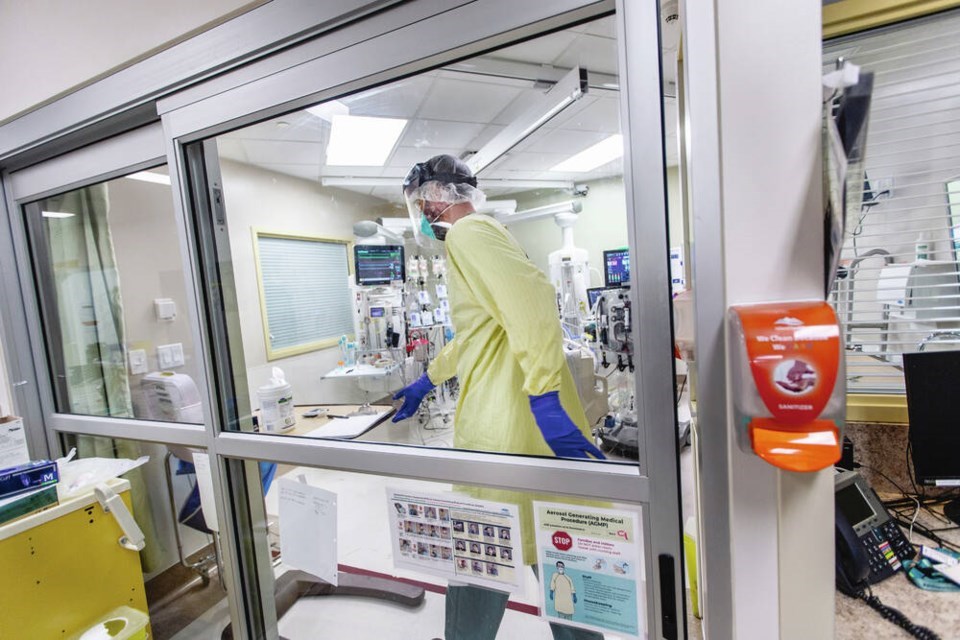COVID-19 hospitalizations in B.C. are projected to peak four to 10 times higher than the previous record during the pandemic, according to an independent modelling group.
More COVID-19 hospitalizations will inevitably lead to more people in intensive care units, putting what's expected to be an unseen level of pressure on hospitals in the province, says the BC COVID-19 Independent Modelling Group.
“The models continue to predict that demand on hospitals will be extreme through the coming month, reaching higher levels than we’ve seen so far,” said University of British Columbia professor Eric Cytrynbaum in a video explaining the group's .
In one of the group’s models, University of Victoria researcher Dean Karlen ran multiple scenarios looking at the effectiveness of public health measures on transmission — all but one lead to more than 1,000 people in the ICU.
And in what Cytrynbaum said is the most likely scenario, more than 2,000 patients would land in B.C.’s intensive care units over the coming weeks. That's approaching triple the capacity of the province's hospitals.
Roughly 90 per cent of B.C.'s 510 base critical care beds were already occupied as of Jan. 4.
And while B.C. hospitals have another 218 surge capacity ICU beds, that's nowhere near what would be required should the modelling group's projections come true.
Boosting won’t be enough to avoid the coming surge either, according to another model from UBC researcher Sally Otto. If everyone over 60 received a booster dose before they were exposed to Omicron, her model finds it would help reduce the peak number of infections but doesn’t prevent a hospital surge.
Depending on how public health measures lead to a delay in transmission, peak hospitalizations are expected in late January to early February.
HOW ARE HOSPITALIZATIONS DIFFERENT WITH OMICRON?
To understand how Omicron could affect hospitals in B.C., the modelling group looked at studies in three other jurisdictions — South Africa, the United Kingdom and Ontario — already coping with an influx of new patients.
The first, a pre-print study published last week in The Lancet looking at hospitalizations of Omicron cases in , found hospitalizations dropped from 16.6 per cent of cases in previous waves to 4.9 per cent for Omicron. Those admitted with Omicron were found to be 73 per cent less likely to have severe outcomes and were released on average after four days instead of seven to eight.
A study found 35 per cent fewer hospitalizations due to Omicron compared to Delta. However, whether a patient was vaccinated made a big difference. Double-vaccinated patients were found to be 76 per cent less likely to end up in hospital, whereas for unvaccinated cases, the likelihood dropped only 26 per cent.
And in , a study released before Christmas found a 54 per cent lower risk of being hospitalized from Omicron versus people infected with the Delta variant.
“That’s the good news. The bad news comes in the transmissibility,” said Cytrynbaum. “Omicron is spreading more.”
Whereas before the new year, Omicron hadn’t surged in every corner of the province, its effects are now evident in every health authority.
CLOSING THE DATA GAP
Using a trend line for those infected over 70 — a population that has been prioritized for testing in B.C. — the modelling group estimates that provincewide cases have been under-reported by a factor of 3.6.
That means for Jan. 3, when 2,230 new infections were reported, the real number of new daily cases likely hit over 8,100.
Why does it matter?
Without good case data, Cytrynbaum says people can’t properly assess their individual risk. Perhaps more importantly, B.C. officials can’t assess the effectiveness of public health measures or when cases peak and officials need to create contingency plans for surging hospitalizations.
The group says the overwhelmed testing capacity has made it extremely difficult to understand how fast the virus is spreading in B.C. The group of scientists say the province needs to move fast to report results from rapid antigen testing and release long-overdue data from viral screening of wastewater.
“We call on B.C. to share this information,” writes the group in their latest report.
With files from Castanet




